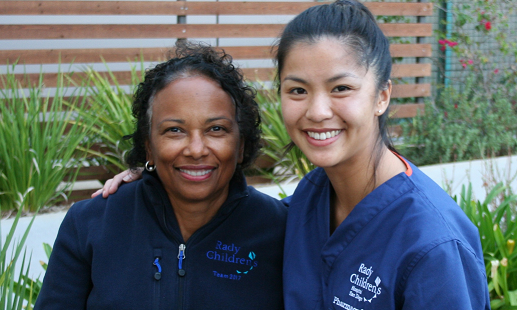If you take a walk by our inpatient pharmacy on the weekend, it’s likely you’ll catch Kelly Chan, a 23-year-old Doctor of Pharmacy candidate at UC San Diego Skaggs School of Pharmacy and Pharmaceutical Sciences, hard at work as an intern. For Kelly, vying for this role was an easy decision — after all, Rady Children’s Hospital-San Diego was the first home she ever knew.
When she was pregnant, Kelly’s mother underwent a procedure that screens for fetal abnormalities through a small sample of amniotic fluid. The analysis revealed that something was seriously wrong with Kelly’s development. Further studies revealed that Kelly would be born with a right-sided diaphragmatic hernia. This rare birth defect results in a large hole in the diaphragm, the muscle that separates the abdomen and chest, and supports breathing function. Through the hole, Kelly’s liver and bowel had moved into her chest, preventing her right lung from developing. Kelly’s mom would need to deliver by cesarean section, and Kelly would require a critical intervention right after birth.
Kelly says she was blue when she was born. “All of my abdominal organs were crushing my lungs. I had to be taken over to Rady Children’s immediately.” She was rushed into surgery at the Hospital’s main campus, and was then admitted to the neonatal intensive care unit (NICU) for recovery. Once there, Kelly recounts that her survival was “a day-by-day thing.” A care team comprising experts including Gail Knight, M.D., M.M.M. (pictured here with Kelly) — then a neonatologist, now senior vice president and chief medical officer — Marva Evans, M.D., and nurse London Carrasca helped her fight every step of the way.
To support her recovery, she was put on an extracorporeal membrane oxygenation (ECMO) device, which stands in for natural heart and lung function and allows key organs to receive oxygen. “To this day, I have a scar on my neck from the veins that they used … I’m reminded every day that I was on this and it was one of the reasons I lived,” she states. ECMO is indeed life-saving and generally safe, but it can sometimes affect blood flow throughout the body, including to the brain. Kelly ended up experiencing brain bleed, and was removed from ECMO to prevent a potential stroke. She persevered, and after a second surgery — which she says was “more routine” than her first — she was released, completing her month-long NICU stay.
“After that, I was a very healthy baby,” Kelly chronicles. “I grew up normally, went to school — like a normal kid. Then, during my senior year of high school, I had a severe pain in my stomach. I couldn’t get rid of it and I didn’t know what it was, so I had to go to the [Scripps Memorial Hospital La Jolla] emergency room. They did a CAT scan on me, and it turned out that I had a twisted intestine.” Ultimately, Kelly’s start-of-life struggles made her healing process this time around a bit easier. “When I woke up [from surgery], the doctor told me he used the same surgical line the doctors used when I was a baby.”
Since then, Kelly has been free of health incidents and laser-focused on her education. Now a second-year pharmacy student, she was on the hunt for an internship opportunity when she heard Rady Children’s had an inpatient spot available. “When I heard we were doing a tour, I thought, ‘wow, I have to do this.’ It’s really cool to work at the same hospital that saved my life,” she comments.
Even before her internship, Kelly made sure to stay connected to Rady Children’s, and to the providers who cared for her more than two decades ago. “I’ve always sent [Dr. Knight and Dr. Evans] Christmas cards every year, and the nurses. My parents developed a very close relationship with them as well. I know [they] love to know I’m being healthy and active,” she explains.
“I have 20+ years of pic[ture]s of her in my office,” confirms Dr. Knight, who recently had an in-person reunion with Kelly when they were both taking care of business at the Hospital.
“It was a touching moment, showing [her] that not only [am I] healthy, but [I can] do everything a normal person can. Especially since there were nights when [she and the care team] thought I might not make it,” says Kelly.
“She’s amazing,” Dr. Knight adds. “Smart as a whip!”
